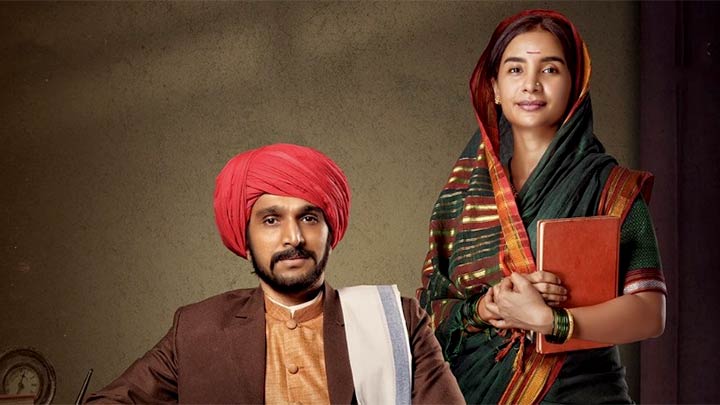Mahatma Jyotirao Phule and Savitri Phule were a social reformer couple who worked for the causes like eradication of caste discrimination, women education, widow remarriage, etc. Filmmmaker Ananth Narayan Mahadevan’s Phule is a biopic on their lives and struggles.
Jyotirao is married off to Savitri when they were kids, as per the traditions and customs of that era. They both belonged to the (so-called) lower caste. Jyotirao starts educating his wife from an early age as he strongly believed that it’s important for women to be educated.
The movie starts off in 1848 when Jyotirao (Pratik Gandhi) and Savitri (Patralekhaa) are already grown-ups and working towards education of girls from their neighbourhood in Pune (then Poona). The two face strong opposition from the (so-called) upper caste people of that time.
Jyotirao’s father (Vinay Pathak) and his elder brother Raja Ram Phule (Sushil Pandey) are also strongly against the couple’s revolutionary activities, which also includes eradication of caste discrimination and encouraging widows to remarry. But Vishnupant Thatte (Adit Redij) goes out of his way to help Jyotirao and Savitri in their mission to educate girls by providing theme space to run a school despite being from the upper caste.
However, after knowing about the couple’s teaching activity, Vinayak Deshpande (Joy Sengupta) and other upper caste members vandalize their school and physically attack Jyotirao. In order to not be a problem for his family, Jyotirao and Savitri shift to the former’s old friend Usman Sheikh’s (Jayesh More) place. Usman has educated his sister Fatima (Akshaya Gurav), who stays with him. Jyotirao opens a school over there. But these aren’t the end of the problems for the couple.
Phule starts off in an abrupt manner when the plague situation of Pune is portrayed. The use of shaky camera while portraying this tragedy also turns out to be a bother. But the film comes on track once the revolutionary activities of the Phule couple begin.
This half boldly shows the atrocities committed by the upper castes on Jyotirao and Savitri. The response of both of them makes us root for them. One is also touched to see the strong bond between the Phule couple and the Sheikh siblings. This aspect speaks a lot without speaking much, considering the times we are living in.
Phule, however, suffers in the second half. The screenplay is bereft of smoothness with one incident following other without proper flow. The narrative also becomes a lot episodic during this half. This largely affects the impact that one expects from a film based on such a revolutionary couple. The last few moments, thankfully, are a saving grace due to the emotional impact.
The film successfully recreates the bygone era through Santosh Phutane’s deft production design. The cinematography, editing and background score fall in the decent category.
The performances of the lead pair excel and rise above the script when things aren’t going great. Pratik Gandhi skillfully gets into the skin of Mahatma Jyotirao Phule and recreates the late figure in a flawless way. Patralekhaa also rises to the occasion with a strong and mature performance as Savitri Phule. Jayesh More and Akshaya Gurav shine as Usman and Fatima.
Amit Behal and Joy Sengupta, as antagonists, are decent. The latter gets repetitive later. Vinay Pathak is a surprise in such a role and he does well. Alexx O’Nell, Ellie and Sara, who play British characters, succeed in leaving behind an impact. Darsheel Safary is wasted in a role that has nothing much to do. Sushil Pandey is average. He too doesn’t get much lines.
Overall: Phule is a decent period drama that has its moments and a fine performance by Pratik Gandhi.
Rating: 3 out of 5
Director: Ananth Narayan Mahadevan
Producers: Dancing Shiva Films and Kingsmen Productions
Writers: Ananth Narayan Mahadevan and Muazzam Beg
Cast: Pratik Gandhi, Patralekhaa, Jayesh More, Akshaya Gurav, Vinay Pathak, Amit Behal
